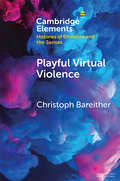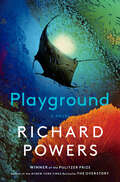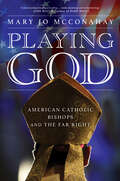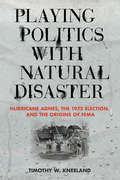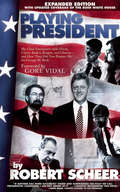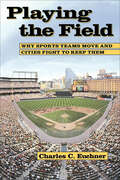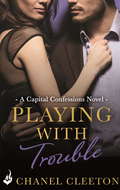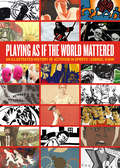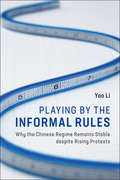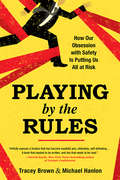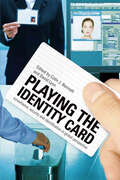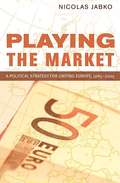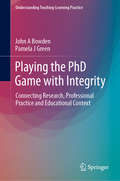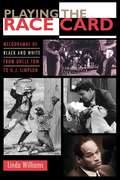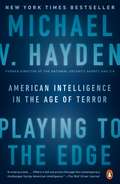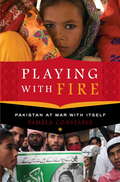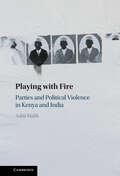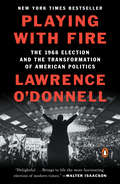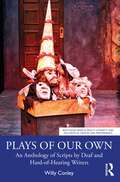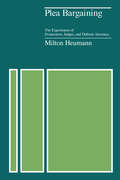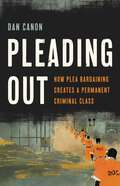- Table View
- List View
Playful Virtual Violence: An Ethnography of Emotional Practices in Video Games (Elements in Histories of Emotions and the Senses)
by Christoph BareitherViolence in video games has been a controversial object of public discourse for several decades. The question of what kind of emotional experiences players enact when playing with representations of physical violence in games has been largely ignored however. Building upon an extensive ethnographic study of players' emotional practices in video games, including participant observation in online games, qualitative interviews, an analysis of YouTube videos and gaming magazines since the 1980s, this Element provides new insights into the complexity and diversity of player experiences and the pleasures of playful virtual violence. Instead of either defending or condemning the players, it contributes foundational, unprejudiced knowledge for a societal and academic debate on a critical aspect of video gaming. This title is also available as Open Access on Cambridge Core.
Playground
by Richard PowersFour lives are drawn together in a sweeping, panoramic new novel from Richard Powers, showcasing the Pulitzer Prize–winning author of The Overstory at the height of his skills. Twelve-year-old Evie Beaulieu sinks to the bottom of a swimming pool in Montreal strapped to one of the world’s first aqualungs. Ina Aroita grows up on naval bases across the Pacific with art as her only home. Two polar opposites at an elite Chicago high school bond over a three-thousand-year-old board game; Rafi Young will get lost in literature, while Todd Keane’s work will lead to a startling AI breakthrough. <P><P> They meet on the history-scarred island of Makatea in French Polynesia, whose deposits of phosphorus once helped to feed the world. Now the tiny atoll has been chosen for humanity’s next adventure: a plan to send floating, autonomous cities out onto the open sea. But first, the island’s residents must vote to greenlight the project or turn the seasteaders away. <P><P> Set in the world’s largest ocean, this awe-filled book explores that last wild place we have yet to colonize in a still-unfolding oceanic game, and interweaves beautiful writing, rich characterization, profound themes of technology and the environment, and a deep exploration of our shared humanity in a way only Richard Powers can. <p> <b>New York Times Bestseller</b>
Playing God: American Catholic Bishops and The Far Right
by Mary Jo McConahay&“A fascinating, investigative dive . . . both alarming and enlightening.&” — Jane Mayer, author of Dark Money The definitive account of how a group of American Catholic bishops are using &“dark money&” and allying with ultra-right evangelicals in an attempt to remake America . . . Seasoned Catholic journalist and former war correspondent Mary Jo McConahay tells the story of how the United States Conference of Catholic Bishops have become one of the most formidable and reactionary forces in America — by campaigning to alter democratic institutions under the guise of religious liberty, and allying with major right-wing contributors such as the Kochs. In fact, many of the bishops—two-hundred and twenty-nine men, almost all white and beyond middle age—are such staunch opponents of Pope Francis that some US Catholics fear a schism with Rome. The influence of these bishops can be traced in recent news stories—such was when they maneuvered to deny the Eucharist to pro-abortion politicians like President Biden. With their lay partners, the bishops also help shepherd cases into the Supreme Court that change the law of the land, as with Roe v. Wade. But as McConahay details, that&’s just the tip of the iceberg. In an investigation reminiscent of Jane Mayer&’s Dark Money, she uncovers an ominous and long-term political strategy of attacking secular, liberal democracy by waging war on democratic norms and institutions.
Playing Oppression: The Legacy of Conquest and Empire in Colonialist Board Games
by Mary Flanagan Mikael JakobssonA striking analysis of popular board games&’ roots in imperialist reasoning—and why the future of play depends on reckoning with it.Board games conjure up images of innocuously enriching entertainment: family game nights, childhood pastimes, cooperative board games centered around resource management and strategic play. Yet in Playing Oppression, Mary Flanagan and Mikael Jakobsson apply the incisive frameworks of postcolonial theory to a broad historical survey of board games to show how these seemingly benign entertainments reinforce the logic of imperialism.Through this lens, the commercialized version of Snakes and Ladders takes shape as the British Empire&’s distortion of Gyan Chaupar (an Indian game of spiritual knowledge), and early twentieth-century &“trading games&” that fêted French colonialism are exposed for how they conveniently sanitized its brutality while also relying on crudely racist imagery. These games&’ most explicitly abhorrent features may no longer be visible, but their legacy still lingers in the contemporary Eurogame tendency to exalt (and incentivize) cycles of exploration, expansion, exploitation, and extermination.An essential addition to any player&’s bookshelf, Playing Oppression deftly analyzes this insidious violence and proposes a path forward with board games that challenge colonialist thinking and embrace a much broader cultural imagination.
Playing Politics with Natural Disaster: Hurricane Agnes, the 1972 Election, and the Origins of FEMA
by Timothy W. KneelandHurricane Agnes struck the United States in June of 1972, just months before a pivotal election and at the dawn of the deindustrialization period across the Northeast. The response by local, state, and national officials had long-term consequences for all Americans. President Richard Nixon used the tragedy for political gain by delivering a generous relief package to the key states of New York and Pennsylvania in a bid to win over voters. After his landslide reelection in 1972, Nixon cut benefits for disaster victims and then passed legislation to push responsibility for disaster preparation and mitigation onto states and localities. The impact led to the rise of emergency management and inspired the development of the Federal Emergency Management Agency (FEMA).With a particular focus on events in New York and Pennsylvania, Timothy W. Kneeland narrates how local, state, and federal authorities responded to the immediate crisis of Hurricane Agnes and managed the long-term recovery. The impact of Agnes was horrific, as the storm left 122 people dead, forced tens of thousands into homelessness, and caused billions of dollars in damage from Florida to New York. In its aftermath, local officials and leaders directed disaster relief funds to rebuild their shattered cities and reshaped future disaster policies.Playing Politics with Natural Disaster explains how the political decisions by local, state, and federal officials shaped state and national disaster policy and continues to influence emergency preparedness and response to this day.
Playing President: My Close Encounters with Nixon, Carter, Bush I, Reagan, and Clinton—and How They Did Not Prepare Me for George W. Bush
by Robert ScheerReflections on, and interviews with, US presidents from Nixon to George W. Bush, from &“one of the best reporters of our time&” (Joan Didion, New York Times–bestselling author of The White Album). Robert Scheer&’s interviews with and profiles of US presidents have shaped journalism history. Scheer developed close journalistic relationships with Richard Nixon, Jimmy Carter, Ronald Reagan, Bill Clinton, and George H. W. Bush, and his reporting on them had a tangible impact on national debate—with examples including the famed 1976 Playboy interview in which then-candidate Jimmy Carter admitted to have lusted in his heart; and the 1980 interview with the Los Angeles Times during which the senior Bush confessed to Scheer his dream of a &“winnable nuclear war.&” In Playing President, Robert Scheer offers an unparalleled insight into the presidential mind, analyzing administrations from Nixon to George W. Bush, offering insights that will surprise the reader—particularly those with rigid preconceptions about the decision-making processes of our leaders. Also included are reprints of Scheer&’s famous presidential interviews, along with previously unpublished interview transcripts and select writings.
Playing The Field: Why Sports Teams Move and Cities Fight to Keep Them
by Charles C. Euchner“Details how owners . . . have shamelessly played cities against one another to get sweetheart deals for their stadiums.” —Sports IllustratedCan a sports franchise “blackmail” a city into getting what it wants—a new stadium, say, or favorable leasing terms—by threatening to relocate? In 1982, the owners of the Chicago White Sox pledged to keep the team in Chicago if the city approved a $5-million tax-exempt bond to finance construction of luxury suites at Comiskey Park. The city council approved it. A few years later, when Comiskey Park was in need of renovation, the owners threatened to move the team to Florida unless a new stadium was built. A site was chosen near the old stadium, property condemned, residents evicted, and a new stadium built. “We had to make threats,” the owners said. “If we didn't have the threat of moving, we wouldn’t have gotten the deal.”Sports is not a dominant industry in any city, this book points out, yet it receives the kind of attention one might expect to be lavished on major producers and employers. In Playing the Field, Charles Euchner examines the relationships between Los Angeles and the Raiders, Baltimore and the Colts and the Orioles, and Chicago and the White Sox, arguing that, in the absence of public standards for equitable arbitration between cities and teams, the sports industry has the ability to steer negotiations in a way that leaves cities vulnerable. He reveals what lies behind this leverage—and what that says about the urban political process.
Playing With Trouble: Capital Confessions 2 (Capital Confessions #2)
by Chanel CleetonFrom the author of Next Year In Havana, a Reese Witherspoon's Book Club pick!Lovers of Scandal and House of Cards, and fans of Kristen Proby, and Lauren Layne will be utterly seduced by this spectacular series. Prepare to be addicted to the love stories, seduction, secrets and lies in the city of scandal...Welcome to Washington, D.C., city of scandal, where no secret stays hidden for long... Blair Reynolds was going to be the ultimate politician's wife - until she caught her fiance cheating on their wedding day. Vowing to make a fresh start Blair enrols in Law School, ready to buckle down. Unless a hot professor gets in the way... Graydon Canter had it all. A flying career, a fortune, and a spot on all the 'Thirty under Thirty' lists - until his rocky personal life threatened everything. Teaching law is a chance to get his life back on track. As long as nothing - and no one - trips him up. When Blair and Gray are thrown together in the classroom, their electric attraction is impossible to ignore. Gray needs to stay away from scandal, and Blair's never been a rule breaker. They're playing with trouble - but maybe such passion is worth the risk? Don't miss Book One in the Capital Confessions series, Flirting With Scandal, and look out for the next tantalising instalment, Falling For Danger.
Playing as if the World Mattered: An Illustrated History of Activism in Sports
by Gabriel KuhnThe world of sports is often associated with commercialism, corruption, and reckless competition. Liberals have objected to sport being used for political propaganda, and leftists have decried its role in distracting the masses from the class struggle. Yet, since the beginning of organized sports, athletes, fans, and officials have tried to administer and play it in ways that strengthen, rather than hinder, progressive social change. From the workers' sports movement in the early 20th century to the civil rights struggle transforming sports in the 1960s to the current global network of grassroots sports clubs, there has been a glowing desire to include sports in the struggle for liberation and social justice. With the help of numerous full-color illustrations—from posters and leaflets to paintings and photographs—Playing as if the World Mattered makes this history tangible and introduces an understanding of sports beyond chauvinistic jingoism, corporate-media chat rooms, and multibillion-dollar business deals.
Playing by the Informal Rules: Why the Chinese Regime Remains Stable despite Rising Protests (Cambridge Studies in Contentious Politics)
by Yao LiGrowing protests in non-democratic countries are often seen as signals of regime decline. China, however, has remained stable amid surging protests. Playing by the Informal Rules highlights the importance of informal norms in structuring state-protester interactions, mitigating conflict, and explaining regime resilience. Drawing on a nationwide dataset of protest and multi-sited ethnographic research, this book presents a bird's-eye view of Chinese contentious politics and illustrates the uneven application of informal norms across regions, social groups, and time. Through examinations of protests and their distinct implications for regime stability, Li offers a novel theoretical framework suitable for monitoring the trajectory of political contention in China and beyond. Overall, this study sheds new light on political mobilization and authoritarian resilience and provides fresh perspectives on power, rules, legitimacy, and resistance in modern societies.
Playing by the Rules
by Michael Hanlon Tracey BrownCan a cell phone cause a major explosion at a gas station? What would happen if the 3 oz rule at airports was abolished? And are all the child protection measures really making children safer? These rules exist in the name of our own protection, but has anyone ever stopped to consider exactly how and why?In Playing by the Rules, authors Tracey Brown and Michael Hanlon dig deeper to discover the real reasons behind many of the global safety rules and security regulations we obey without question, and their conclusions range from the surprisingly pointless to shockingly dangerous. Does it make sense to surrender your nail clippers to board a plane equipped with an axe on the back of the cockpit door? And is there really a good reason to prevent an adult from swimming in a lake more than a foot deep? This engrossing study will inspire readers to question the people and organizations who come up with life's little guidelines - and empower you to live life to the full.
Playing the Field: Why Sports Teams Move and Cities Fight to Keep Them
by Charles C. EuchnerCan a sports franchise "blackmail" a city into getting what it wants—a new stadium, say, or favorable leasing terms—by threatening to relocate? In 1982, the owners of the Chicago White Sox pledged to keep the team in Chicago if the city approved a $5-million tax-exempt bond to finance construction of luxury suites at Comiskey Park. The city council approved it. A few years later, when Comiskey Park was in need of renovation, the owners threatened to move the team to Florida unless a new stadium was built. A site was chosen near the old stadium, property condemned, residents evicted, and a new stadium built. "We had to make threats," the owners said. "If we didn't have the threat of moving, we wouldn't have gotten the deal." "Sports is not a dominant industry in any city," writes Charles Euchner, "yet it receives the kind of attention one might expect to be lavished on major producers and employers." In Playing the Field, Euchner looks at why sports attracts this kind of attention and what that says about the urban political process. Examining the relationships between Los Angeles and the Raiders, Baltimore and the Colts and the Orioles, and Chicago and the White Sox, Euchner argues that, in the absence of public standards for equitable arbitration between cities and teams, the sports industry has the ability to steer negotiations in a way that leaves cities vulnerable.According to Euchner, this greater leverage of sports franchises is due, at least in part, to their overall economic insignificance. Since the demands of a franchise do not directly affect many interest groups, opponents of stadium projects have difficulty developing coalitions to oppose them. The result is that civic leaders tend to succumb to the blackmail tactics of professional sports, rather than developing and supporting sound economic policies.
Playing the Identity Card: Surveillance, Security and Identification in Global Perspective
by David Lyon Colin J. BennettNational identity cards are in the news. While paper ID documents have been used in some countries for a long time, today's rapid growth features high-tech IDs with built-in biometrics and RFID chips. Both long-term trends towards e-Government and the more recent responses to 9/11 have prompted the quest for more stable identity systems. Commercial pressures mix with security rationales to catalyze ID development, aimed at accuracy, efficiency and speed. New ID systems also depend on computerized national registries. Many questions are raised about new IDs but they are often limited by focusing on the cards themselves or on "privacy." Playing the Identity Card shows not only the benefits of how the state can "see" citizens better using these instruments but also the challenges this raises for civil liberties and human rights. ID cards are part of a broader trend towards intensified surveillance and as such are understood very differently according to the history and cultures of the countries concerned.
Playing the Market
by Nicolas JabkoIn the 1980s and 1990s, Nicolas Jabko suggests, the character of European integration altered radically, from slow growth to what he terms a "quiet revolution. " In this book he traces the political strategy that underlay the move from the Single Market of 1986 through the official creation of the European Union in 1992 to the coming of the euro in 1999. The official, shared language of the political forces behind this revolution was that of market reforms-yet, as Jabko notes, this was a very strange "market" revolution, one that saw the building of massive new public institutions designed to regulate economic activity, such as the Economic and Monetary Union, and deeper liberalization in economic areas unaffected by external pressure than in truly internationalized sectors of the European economy. What held together this remarkably diverse reform movement? Precisely because "the market" wasn't a single standard, the agenda of market reforms gained the support of a vast and heterogenous coalition. The "market" was in fact a broad palette of ideas to which different actors could appeal under different circumstances. It variously stood for a constraint on government regulations, a norm by which economic activities were (or should be) governed, a space for the active pursuit of economic growth, an excuse to discipline government policies, and a beacon for new public powers and rule-making. In chapters on financial reform, the provision of collective services, regional development and social policy, and economic and monetary union, Jabko traces how a coalition of strange bedfellows mobilized a variety of market ideas to integrate Europe.
Playing the PhD Game with Integrity: Connecting Research, Professional Practice and Educational Context (Understanding Teaching-Learning Practice)
by John A Bowden Pamela J GreenThis book focuses on integrity throughout the PhD journey and beyond, and is organised around two main themes: (1) integrity in relation to the capabilities developed by doctoral candidates for professional practice; and (2) integrity and coherence at the PhD system level. The working methods of key participants such as PhD candidates, supervisors, university managers, government agencies and politicians are central to achieving integrity goals within PhD programmes. In this context, a number of constructs are developed that inform the practice-based elements of the book in relation to conducting doctoral research, research supervision, academic writing, and research training support systems; in particular, these include our Moral Compass Framework for professional integrity, notions of collective morality, decision-making when faced with ‘wicked’ problems, connected moral capability and our double-helix model of capability development, negotiated sense in contrast with common sense, completion mindsets and contexts, mindfulness, liminality, and mutual catalysis in joint authorship.While the data the book employs stems from practice-led research within the Australian doctoral system, the conclusions drawn are of global relevance. Throughout the book, wherever appropriate, comparisons are made between the Australian context and other contexts, such as the doctoral systems of the United Kingdom, Europe and the United States.
Playing the Race Card: Melodramas of Black and White from Uncle Tom to O. J. Simpson
by Linda WilliamsThe black man suffering at the hands of whites, the white woman sexually threatened by the black man. Both images have long been burned into the American conscience through popular entertainment, and today they exert a powerful and disturbing influence on Americans' understanding of race. So argues Linda Williams in this boldly inquisitive book, where she probes the bitterly divisive racial sentiments aroused by such recent events as O. J. Simpson's criminal trial. Williams, the author of Hard Core, explores how these images took root, beginning with melodramatic theater, where suffering characters acquire virtue through victimization. The racial sympathies and hostilities that surfaced during the trial of the police in the beating of Rodney King and in the O. J. Simpson murder trial are grounded in the melodramatic forms of Uncle Tom's Cabin and The Birth of a Nation. Williams finds that Stowe's beaten black man and Griffith's endangered white woman appear repeatedly throughout popular entertainment, promoting interracial understanding at one moment, interracial hate at another. The black and white racial melodrama has galvanized emotions and fueled the importance of new media forms, such as serious, "integrated" musicals of stage and film, including The Jazz Singer and Show Boat. It also helped create a major event out of the movie Gone With the Wind, while enabling television to assume new moral purpose with the broadcast of Roots. Williams demonstrates how such developments converged to make the televised race trial a form of national entertainment. When prosecutor Christopher Darden accused Simpson's defense team of "playing the race card," which ultimately trumped his own team's gender card, he feared that the jury's sympathy for a targeted black man would be at the expense of the abused white wife. The jury's verdict, Williams concludes, was determined not so much by facts as by the cultural forces of racial melodrama long in the making. Revealing melodrama to be a key element in American culture, Williams argues that the race images it has promoted are deeply ingrained in our minds and that there can be no honest discussion about race until Americans recognize this predicament.
Playing to Win: An Insider's Guide to Politics
by Jeff GreenfieldIncludes topics such as Understanding the Political Terrain, Getting Into the Game, Choosing Your Campaign Issues, and How to give speeches, use the media, advertise, debate, get re-elected, and make things better.
Playing to the Edge: American Intelligence in the Age of Terror
by Michael V. HaydenAn unprecedented high-level master narrative of America's intelligence wars, from the only person ever to helm both CIA and NSA, at a time of heinous new threats and wrenching change For General Michael Hayden, playing to the edge means playing so close to the line that you get chalk dust on your cleats. Otherwise, by playing back, you may protect yourself, but you will be less successful in protecting America. "Play to the edge" was Hayden's guiding principle when he ran the National Security Agency, and it remained so when he ran CIA. In his view, many shortsighted and uninformed people are quick to criticize, and this book will give them much to chew on but little easy comfort; it is an unapologetic insider's look told from the perspective of the people who faced awesome responsibilities head on, in the moment. How did American intelligence respond to terrorism, a major war and the most sweeping technological revolution in the last 500 years? What was NSA before 9/11 and how did it change in its aftermath? Why did NSA begin the controversial terrorist surveillance program that included the acquisition of domestic phone records? What else was set in motion during this period that formed the backdrop for the infamous Snowden revelations in 2013? As Director of CIA in the last three years of the Bush administration, Hayden had to deal with the rendition, detention and interrogation program as bequeathed to him by his predecessors. He also had to ramp up the agency to support its role in the targeted killing program that began to dramatically increase in July 2008. This was a time of great crisis at CIA, and some agency veterans have credited Hayden with actually saving the agency. He himself won't go that far, but he freely acknowledges that CIA helped turn the American security establishment into the most effective killing machine in the history of armed conflict. For 10 years, then, General Michael Hayden was a participant in some of the most telling events in the annals of American national security. General Hayden's goals are in writing this book are simple and unwavering: No apologies. No excuses. Just what happened. And why. As he writes, "There is a story here that deserves to be told, without varnish and without spin. My view is my view, and others will certainly have different perspectives, but this view deserves to be told to create as complete a history as possible of these turbulent times. I bear no grudges, or at least not many, but I do want this to be a straightforward and readable history for that slice of the American population who depend on and appreciate intelligence, but who do not have the time to master its many obscure characteristics."From the Hardcover edition.
Playing to the Edge: American Intelligence in the Age of Terror
by Michael V. HaydenAn unprecedented high-level master narrative of America's intelligence wars, from the only person ever to helm both CIA and NSA, at a time of heinous new threats and wrenching change<P><P> For General Michael Hayden, playing to the edge means playing so close to the line that you get chalk dust on your cleats. Otherwise, by playing back, you may protect yourself, but you will be less successful in protecting America. "Play to the edge" was Hayden's guiding principle when he ran the National Security Agency, and it remained so when he ran CIA. In his view, many shortsighted and uninformed people are quick to criticize, and this book will give them much to chew on but little easy comfort; it is an unapologetic insider's look told from the perspective of the people who faced awesome responsibilities head on, in the moment. <P> How did American intelligence respond to terrorism, a major war and the most sweeping technological revolution in the last 500 years? What was NSA before 9/11 and how did it change in its aftermath? Why did NSA begin the controversial terrorist surveillance program that included the acquisition of domestic phone records? What else was set in motion during this period that formed the backdrop for the infamous Snowden revelations in 2013? <P> As Director of CIA in the last three years of the Bush administration, Hayden had to deal with the rendition, detention and interrogation program as bequeathed to him by his predecessors. He also had to ramp up the agency to support its role in the targeted killing program that began to dramatically increase in July 2008. This was a time of great crisis at CIA, and some agency veterans have credited Hayden with actually saving the agency. He himself won't go that far, but he freely acknowledges that CIA helped turn the American security establishment into the most effective killing machine in the history of armed conflict.<P> For 10 years, then, General Michael Hayden was a participant in some of the most telling events in the annals of American national security. General Hayden's goals are in writing this book are simple and unwavering: No apologies. No excuses. Just what happened. And why. As he writes, "There is a story here that deserves to be told, without varnish and without spin. My view is my view, and others will certainly have different perspectives, but this view deserves to be told to create as complete a history as possible of these turbulent times. I bear no grudges, or at least not many, but I do want this to be a straightforward and readable history for that slice of the American population who depend on and appreciate intelligence, but who do not have the time to master its many obscure characteristics." <P><b>A New York Times Bestseller</b>
Playing with Fire
by Pamela ConstableA volatile nation at the heart of major cultural, political, and religious conflicts in the world today, Pakistan commands our attention. Yet more than six decades after the country's founding as a Muslim democracy, it continues to struggle over its basic identity, alliances, and direction. In Playing with Fire, acclaimed journalist Pamela Constable peels back layers of contradiction and confusion to reveal the true face of modern Pakistan.In this richly reported and movingly written chronicle, Constable takes us on a panoramic tour of contemporary Pakistan, exploring the fears and frustrations, dreams and beliefs, that animate the lives of ordinary citizens in this nuclear-armed nation of 170 million. From the opulent, insular salons of the elite to the brick quarries where soot-covered workers sell their kidneys to get out of debt, this is a haunting portrait of a society riven by inequality and corruption, and increasingly divided by competing versions of Islam.Beneath the façade of democracy in Pakistan, Constable reveals the formidable hold of its business, bureaucratic, and military elites--including the country's powerful spy agency, the ISI. This is a society where the majority of the population feels powerless, and radical Islamist groups stoke popular resentment to recruit shock troops for global jihad. Writing with an uncommon ear for the nuances of this conflicted culture, Constable explores the extent to which faith permeates every level of Pakistani society--and the ambivalence many Muslims feel about the role it should play in the life of the nation.Both an empathic and alarming look inside one of the world's most violent and vexing countries, Playing with Fire is essential reading for anyone wishing to understand modern Pakistan and its momentous role on today's global stage.From the Hardcover edition.
Playing with Fire: Parties and Political Violence in Kenya and India
by Aditi MalikDrawing on a rare cross-regional comparison of Kenya and India, Playing with Fire develops a novel explanation about ethnic party violence. Combining rich historical, qualitative, and quantitative data, the book demonstrates how levels of party instability can crucially inform the decisions of political elites to organize or support violence. Centrally, it shows that settings marked by unstable parties are more vulnerable to experiencing recurring and major episodes of party violence than those populated by durable parties. This is because transient parties enable politicians to disregard voters' future negative reactions to conflict. By contrast, stable party organizations compel politicians to take such costs into account, thereby dampening the potential for recurring and severe party violence. By centering political parties as key actors in the production of conflict, and bringing together evidence from both Africa and South Asia, Playing with Fire contributes new insights to the study of political violence.
Playing with Fire: The 1968 Election and the Transformation of American Politics
by Lawrence O'Donnell<P>From the host of MSNBC’s The Last Word with Lawrence O'Donnell, an important and enthralling new account of the presidential election that changed everything, the race that created American politics as we know it todayThe 1968 U.S. Presidential election was the young Lawrence O’Donnell’s political awakening, and in the decades since it has remained one of his abiding fascinations. <P>For years he has deployed one of America’s shrewdest political minds to understanding its dynamics, not just because it is fascinating in itself, but because in it is contained the essence of what makes America different, and how we got to where we are now. Playing With Fire represents O’Donnell’s master class in American electioneering, embedded in the epic human drama of a system, and a country, coming apart at the seams in real time. <P>Nothing went according to the script. LBJ was confident he'd dispatch with Nixon, the GOP frontrunner; Johnson's greatest fear and real nemesis was RFK. But Kennedy and his team, despite their loathing of the president, weren't prepared to challenge their own party’s incumbent. Then, out of nowhere, Eugene McCarthy shocked everyone with his disloyalty and threw his hat in the ring to run against the president and the Vietnam War. <P>A revolution seemed to be taking place, and LBJ, humiliated and bitter, began to look mortal. Then RFK leapt in, LBJ dropped out, and all hell broke loose. Two assassinations and a week of bloody riots in Chicago around the Democratic Convention later, and the old Democratic Party was a smoldering ruin, and, in the last triumph of old machine politics, Hubert Humphrey stood alone in the wreckage. <P>Suddenly Nixon was the frontrunner, having masterfully maintained a smooth façade behind which he feverishly held his party’s right and left wings in the fold, through a succession of ruthless maneuvers to see off George Romney, Nelson Rockefeller, Ronald Reagan, and the great outside threat to his new Southern Strategy, the arch-segregationist George Wallace. But then, amazingly, Humphrey began to close, and so, in late October, Nixon pulled off one of the greatest dirty tricks in American political history, an act that may well meet the statutory definition of treason. The tone was set for Watergate and all else that was to follow, all the way through to today. <P><b>A New York Times Bestseller</b>
Plays of Our Own: An Anthology of Scripts by Deaf and Hard-of-Hearing Writers (Routledge Series in Equity, Diversity, and Inclusion in Theatre and Performance)
by Willy ConleyPlays of Our Own is the first anthology of its kind containing an eclectic range of plays by Deaf and hard-of-hearing writers. These writers have made major, positive contributions to world drama or Deaf theatre arts. Their topics range from those completely unrelated to deafness to those with strong Deaf-related themes such as a dreamy, headstrong girl surviving a male-dominated world in Depression-era Ireland; a famous Spanish artist losing his hearing while creating his most controversial art; a Deaf African-American woman dealing with AIDS in her family; and a Deaf peddler ridiculed and rejected by his own kind for selling ABC fingerspelling cards. The plays are varied in style – a Kabuki western, an ensemble-created variety show, a visual-gestural play with no spoken nor signed language, a cartoon tragicomedy, historical and domestic dramas, and a situation comedy. This volume contains the well-known Deaf theatre classics, My Third Eye and A Play of Our Own. At long last, directors, producers, Deaf and hearing students, professors, and researchers will be able to pick up a book of "Deaf plays" for production consideration, Deaf culture or multicultural analysis, or the simple pleasure of reading.
Plea Bargaining: The Experiences of Prosecutors, Judges, and Defense Attorneys
by Milton Heumann"That relatively few criminal cases in this country are resolved by full Perry Mason-style strials is fairly common knowledge. Most cases are settled by a guilty plea after some form of negotiation over the charge or sentence. But why? The standard explanation is case pressure: the enormous volume of criminal cases, to be processed with limited staff, time and resources. . . . But a large body of new empirical research now demands that we re-examine plea negotiation. Milton Heumann's book, Plea Bargaining, strongly and explicitly attacks the case-pressure argument and suggests an alternative explanation for plea bargaining based on the adaptation of attorneys and judges to the local criminal court. The book is a significant and welcome addition to the literature. Heumann's investigation of case pressure and plea negotiation demonstrates solid research and careful analysis."—Michigan Law Review
Pleading Out: How Plea Bargaining Creates a Permanent Criminal Class
by Dan CanonA blistering critique of America&’s assembly-line approach to criminal justice and the shameful practice at its core: the plea bargain Most Americans believe that the jury trial is the backbone of our criminal justice system. But in fact, the vast majority of cases never make it to trial: almost all criminal convictions are the result of a plea bargain, a deal made entirely out of the public eye. Law professor and civil rights lawyer Dan Canon argues that plea bargaining may swiftly dispose of cases, but it also fuels an unjust system. This practice produces a massive underclass of people who are restricted from voting, working, and otherwise participating in society. And while innocent people plead guilty to crimes they did not commit in exchange for lesser sentences, the truly guilty can get away with murder. With heart-wrenching stories, fierce urgency, and an insider&’s perspective, Pleading Out exposes the ugly truth about what&’s wrong with America&’s criminal justice system today—and offers a prescription for meaningful change.
